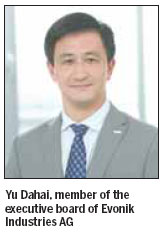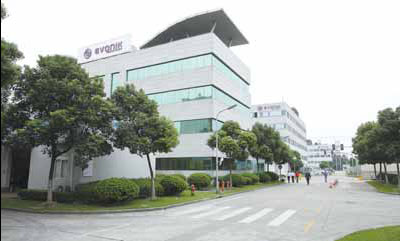Industry Special: Evonik promotes tech-driven urbanization
Updated: 2013-04-08 07:59
By Wang Ying in Shanghai (China Daily)
|
||||||||
|
One of the global leading producers of specialty chemicals, Evonik Industries AG offers a range of solutions for transportation, energy efficiency and food safety. Photos Provided to China Daily |

China's accelerating urbanization will create many business opportunities in a variety of fields while posing new challenges to city planners, said a senior executive of a foreign company.
Urbanization is the driver of new growth and innovative business ideas, said Yu Dahai, member of the executive board of Evonik Industries AG, one of the world leaders in specialty chemicals.
He said the intelligent solutions his company can offer are of particular significance to China's urbanization in terms of transportation, energy efficiency, food safety and other vital issues.
Evonik produces a range of amino acids and healthcare products that can help improve food security and meet the increasing demand for healthcare products associated with urbanization in China, Yu said.
In terms of transportation, it provides various products that help to cut energy consumption and lower emissions.
Evonik is paving the way for the next generation of eco-friendly and energy-efficient cars by developing lightweight structural parts. Its ultra-light structural foams, innovative polymer glazing, structural hybrid parts and adhesive products can reduce vehicle weight by up to 60 percent.
And the company's competence in silicas and silanes is being used to develop modern, fuel-saving tires.
It is also working closely with major Chinese carmakers by providing tailor-made solutions on fuel-efficiency vehicles like electric cars.
"We aim not only to save costs but also give drivers a better driving experience," Yu said.
He said urbanization is a major global trend and China's mega-cities are the hot spots of economic growth.
Evonik already has a number of products that can help meet the challenges of metropolises, such as energy supply, Yu added.
"Increasing energy demand in China must be satisfied with more efficient use of energy." Yu said.
"If you look at the buildings, most of them are still not insulated," he said.
Evonik established an in-house corporate team to plot the company's strategy for the next 10 to 15 years. Using trend analysis, it identified challenges that will affect markets in the future with an eye toward technologies for urban areas.
Its latest portfolio includes a range of insulation materials for the outer walls of buildings.
For example, Evonik is now building a new plant for hydrogen peroxide in Jilin province. Upon completion, it will supply the product to the adjacent propylene oxide plant run by its customer. Propylene oxide is a precursor of polyurethane, the main material for housing insulation.
Setting an example
Yu said Evonik expects this project will not only provide products to meet the needs of the market, but also set an example of how to make the chemical industry much more efficient and environmentally friendly.
He said these are challenges the Chinese chemical industry has faced for years, adding that chemical production does not need to be harmful to the environment.
He pointed out that the industry in Europe has been successfully dealing with environmental issues for decades.
"Evonik is committed to the Global Responsible Care initiative, and we constantly strive to maintain high environmental, safety, health and quality values and standards. We implement a strict ESHQ management system to ensure conformity to the relevant rules and regulations," Yu said.
"All Evonik sites in China are ISO 14001 certified. Such a high standard applies also to the safety of the workers in the company's numerous facilities," he added.
Yu pointed out that the entry threshold for chemicals production in China is relatively low, which causes many environmental problems.
"A lot of chemicals companies produce goods without paying the bill for polluting environment," he said.
"It should be changed." Yu said.
To balance industrial development and environmental protection, Yu urges the Chinese government to increase the threshold for producing chemicals and ensure that environmental regulations will be applied more strictly.
He said Evonik's business activities conform to global trends like health, nutrition, resource efficiency and globalization because the company's leadership feels it has a social responsibility to support balanced urbanization.
In its 2012 fiscal year, Evonik generated sales revenue of around 13.6 billion euros ($17.4 billion) and an operating profit of about 2.6 billion euros.
The Asia-Pacific region now accounts for nearly one-fifth of group sales. Evonik has a clear strategic plan in the region and aims to significantly increase sales in Asia in the next few years.
Yu said Evonik will substantially increase investment in the region. It will invest a total of about 2 billion euros until 2016. This includes its strategic investment in the Shanghai Chemical Industry Park.
Last year, it built a methionine complex in Singapore. And recently, Evonik announced it intends to develop production facilities for specialty chemicals with Petronas in Malaysia.
Yu said the company is facing greater competition not only in other regions but also in China. But Evonik is confident because "it pays lot of attention to research and development", he said.
Core competence
"Innovation is our core competence which differentiates us from competitors," Yu said.
Evonik invested 393 million euros in R&D in 2012, 8 percent more than in 2011, to strengthen its technological competence in many business areas.
Sluggish economic growth in Europe has forced Evonik and many other European enterprises to expand their operations in China and other emerging markets.
Although Evonik still maintains a substantial presence in Europe, Yu said his company will focus more on growth regions, such as Southeast Asia, South America and China.
"Europe is our home. We need to find a second home in Asia. And increasingly we are feeling at home in Asia," Yu said.
"We never considered China merely as a manufacturing base. It is also a highly competitive marketplace. To ensure lasting success and sustained growth in China, it's not sufficient to just build large-scale local production facilities," Yu said, adding that Evonik is expanding its Shanghai R&D center for the third time since it opened in 2004. The expansion is scheduled to be operational by autumn 2013.
Yu said China offers plenty of business opportunities. For example, the growth of the nation's middle class has increased demand for food safety, cosmetics and pharmaceutical products.
"This is a great opportunity for Evonik because our products and solutions are always intermeshed with the requirements of the markets and customers. For instance, our amino acids help make fish and meat production more efficient and more environmentally friendly. And we are opening up new applications of our high-performance polymers in medical technology and the use of renewable energies," Yu said.
Yu noted that one of the problems of the Chinese chemical industry is fragmentation. There are too many small companies scattered all over China because of lack of barriers to entry in the industry, he said.
"The chemical parks are a good solution for that because they can facilitate safer production. However it's not enough. The industry needs to look at implementing international codes to ensure safety of production and safe transportation of chemical products," he said.
And he suggested the government take fundamental steps to consolidate the industry through stricter enforcement of regulations and IP management.
Yu said another challenge facing Chinese companies is about retaining qualified workers and professionals.
"It is not predominantly a matter of high salary. Offering your staff promising career development opportunities is much more important," he said.
His last advice is to trust in the capabilities of workers.
"I have worked in Evonik for 20 years," Yu said, "I am happy because I am made to feel that I can change something."
He said Evonik regards people as the most important assets for its sustainable growth. The company has been named China's Top Employer for six years by the Corporate Research Foundation Institute.
Zhang Xiaoxian in Shanghai contributed to this story
wang_ying@chinadaily.com.cn
(China Daily 04/08/2013 page2)

 In Photos: 7.0-magnitude quake hits Sichuan
In Photos: 7.0-magnitude quake hits Sichuan
 Li Na on Time cover, makes influential 100 list
Li Na on Time cover, makes influential 100 list
 FBI releases photos of 2 Boston bombings suspects
FBI releases photos of 2 Boston bombings suspects
 World's wackiest hairstyles
World's wackiest hairstyles
 Sandstorms strike Northwest China
Sandstorms strike Northwest China
 Never-seen photos of Madonna on display
Never-seen photos of Madonna on display
 H7N9 outbreak linked to waterfowl migration
H7N9 outbreak linked to waterfowl migration
 Dozens feared dead in Texas plant blast
Dozens feared dead in Texas plant blast
Most Viewed
Editor's Picks

|

|

|

|

|

|
Today's Top News
Live report: 7.0-magnitude quake hits Sichuan, heavy casualties feared
Boston suspect cornered on boat
Cross-talk artist helps to spread the word
'Green' awareness levels drop in Beijing
Palace Museum spruces up
First couple on Time's list of most influential
H7N9 flu transmission studied
Trading channels 'need to broaden'
US Weekly

|

|








